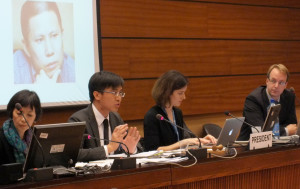 The International Campaign for Tibet (ICT) held a joint side event with the International Federation for Human Rights (FIDH) and Human Rights in China (HRIC) on “Challenges to Civil Society by China’s Security Laws” on the eve of China’s second Universal Periodic Review (UPR) at the Human Rights Council in Geneva.
The International Campaign for Tibet (ICT) held a joint side event with the International Federation for Human Rights (FIDH) and Human Rights in China (HRIC) on “Challenges to Civil Society by China’s Security Laws” on the eve of China’s second Universal Periodic Review (UPR) at the Human Rights Council in Geneva.
The panel focused on civil society’s role in advancing progress and addressing China’s human rights challenges, as well as the challenges to fundamental rights and freedoms presented by national security laws. Speaking at the event, Kai Müller, Executive Director of ICT Germany, pointed out the extreme difficulties Tibetans face in order to engage with civil society under Chinese policies. Government authorities tightly restrict phone and internet communications in Tibetan areas, especially where self-immolation protests have occurred. Moreover, Müller said, “state security laws have been very often used to persecute politically-engaged Tibetans and that many of the verdicts, which led to the imprisonment of Tibetan citizens, have been imposed on grounds of separatism or ‘splittism’.”
HRIC, represented by Sharon Hom and Shiwei Ye, highlighted the issues of arbitrary detentions of civil society activists pressing for greater transparency and participation, as well as censorship and difficulty accessing information.
The event was chaired by Julie Gromellon, FIDH’s representative in Geneva, and was held in Salle XXV, Palai De Nations. Approximately 60 people attended the event, including representatives of civil society groups, Geneva-based permanent representations, and journalists.
The participants noted the very low degree of participation granted to Chinese activists in the drafting of China’s national UPR report, pointing out that Chinese human rights defenders have been prevented by their government from travelling to Geneva. The panelists also raised concerns over how China sets standards for other countries that it does not apply to itself; during Saudi Arabia’s UPR that morning, China recommended “enhancing the cooperation between the government and Saudi’s civil society.”
ICT has issued an analysis which finds that China’s report to the Council ignores the wide range of human rights problems in Tibetan areas that have been documented by the UN, the U.S. and other governments. Instead, China’s report resorts to false platitudes, claiming it is “fully respecting freedom of religious belief in ethnic regions in Tibet.”
Several nations are poised to challenge China’s policies in Tibet during China’s UPR, which will take place on October 22 from 9:30 am to 12:30 pm (Geneva time). Other states will ask oral questions and submit their recommendations. The review report will be adopted on October 25th.

